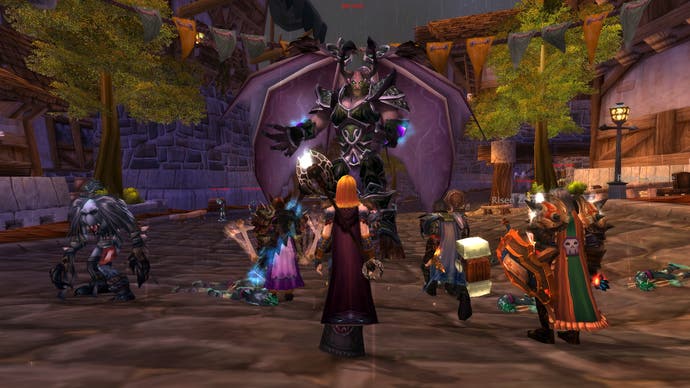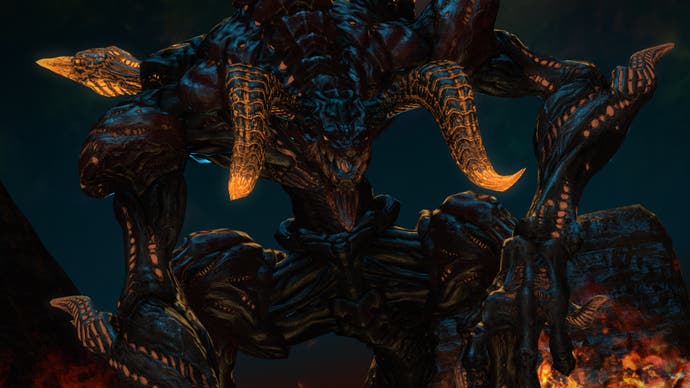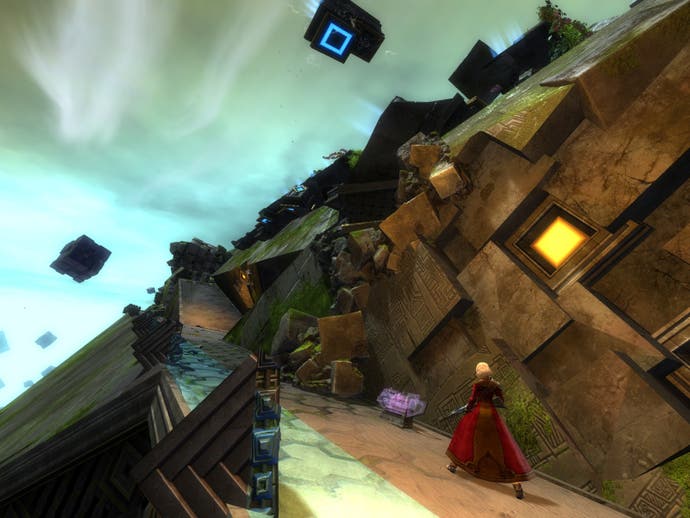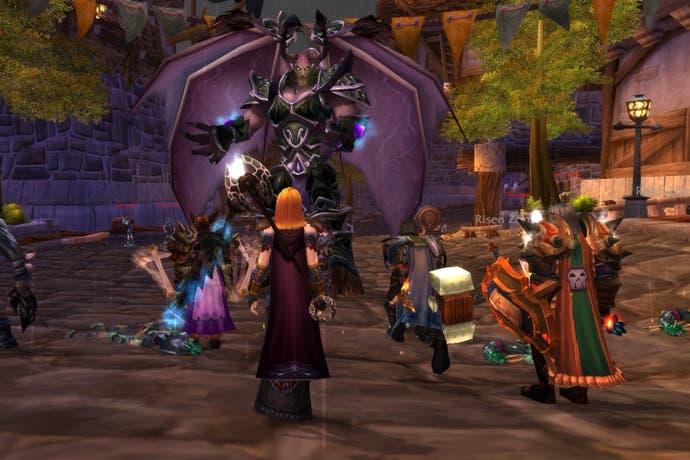Questing for heroism in MMOs
Dungeons and dragging on.
Dungeons and raids are usually the most exciting part of any MMO, but there's still depressingly little heroism to be had in most of them. To be fair, there's a tiny sliver of time when this isn't the case - when a new dungeon arrives in, say, World of Warcraft, and teams have to go face its bosses and other challenges without a convenient wiki on hand. Those early days can be amazing.
Almost immediately though, heroism goes from defying the odds to merely consulting them; of not simply going in to pit a party's skill against the latest threat to their world, but having the Dummies Guide To Killing This Guy under one arm. Worse, the expectation of this knowledge brings out the worst in the average MMO player, who has usually seen everything a hundred times and just wants to get to the end to get their shiny whatever.
Not only does this breed hostility towards new players, thanks to far too many old hands forgetting the time they served at the business end of the learning curve, it produces a vicious cycle where design increasingly has to be built around efficiency rather than actual adventure. The descent can be seen best in WOW, which started with dungeons of a comparable size and scope to a standard RPG, but inevitably got whittled down to little but a few boxes for bosses and corridors full of trash mobs. If anything, it's a wonder players still tolerate those.

The problem for developers is that every move to address this has had a negative reaction. Dungeon finders and looking-for-group tools sound like a great idea, but in practice they produce groups with no sense of camaraderie or tolerance. Playing with difficulty, a game will either alienate the side of its player base that wants loot or the side that wants a challenge, because going for the middle ground never pleases anyone. Every player type inevitably assumes they're the core audience for the game, whether they're hardcore raiders or casual players who never do anything but follow a solo-focused personal storyline (whose recent popularity is in itself a painful reminder that most MMOs fail miserably at making players feel invested via their USP).
This makes dungeon design inherently tricky. Millions of people like them just as they are, and that's fine - though it's worth remembering that this is a self-selected group assembled over a decade or so of MMOs Just Working Like This and thus to at least some degree invested in the status quo. Still, there should be some ways to improve it, and a good starting point would be better matchmaking. Gear level and skill are completely different things, especially factoring in players with multiple characters, and new players learning the ropes together usually beats tagging along with a team that already intimately knows exactly what has to be done at every point.
More dramatically, it's time to consider whether or not we actually need the huge, expansive worlds any more, and whether they're getting in the way of the multiplayer experiences that players can't get anywhere else. One of the common complaints about LFG tools is that they turn worlds into lobbies, so we're already halfway to ditching them. Moreover, most of the time the hugely expense in creating extra space is little more than padding anyway, with players routinely claiming that the endgame is the 'real' game and even popular releases tending to become ghost towns rather than thriving fantasy kingdoms shortly after launch.

Maybe it's time for dungeons and raids to stand alone, with players following the classic Dungeons & Dragons "You all meet in an inn" template and simply teleporting to interesting places without all the wandering and FedEx questing getting in the way. It's not as though there aren't games like Skyrim that offer more involving solo experiences than any MMO ever will.
The big advantage there would be allowing designers to better cater to all tastes, but there are smaller ones too - a much easier basis for Neverwinter-style player-created content, for instance, where a team can come together, or be assembled from around a single town, hit a 'random' button and get a hand-crafted but still fresh test of skill. Long dungeon crawl? Quick hack-and-slash? As long as the content kept flowing, there'd be plenty of choice, turning an evening in a dungeon with friends into something more like joining them for a game of Dota.
By thinking in game terms rather than world simulation terms, there's also a lot more scope to set things like daily challenges, mutators and bounties for specific enemy types, which should encourage even the efficiency-minded players to keep moving around.

What I'd like to see most though is an element of surprise value, ideally tied to the players involved. Making a dungeon feel heroic is primarily about achievement rather than narrative, with long, complicated stories getting in the way as soon as even one player knows what's coming. There are ways to work a more dynamic personal story in though, like having groups that players have enmity with show up during a dungeon to back up the usual mobs, as well as scope for easy last-minute carpet pulls like swapping the boss for someone unexpected. Better still, we could have the first proper MMO roguelike, which it really seems like we should have seen by now.
The core of the problem though is that no experience where victory is guaranteed can be seen as heroic, which is what dungeons and raids inevitably become after a while. People don't typically keep playing them because the experience is so good, but because the game design forces repetition and replay long past the point that everyone's kitted out well enough to be able to snooze through the supposedly epic challenges but still has to keep grinding through them to make a few numbers go up a bit.
There's no arguing that it's worked over the last few years, but as even World of Warcraft's numbers slip and the genre as a whole faces competition from elsewhere, this is a great time to go back to the drawing board and make sure that the most social, the most challenging, the most potentially impressive part of the experience can still pull its weight - even when it's not bribing players to endure it.

